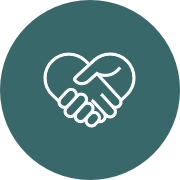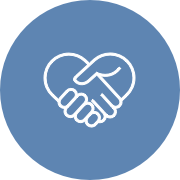
FaSST/Connections
Robin held her thumb and forefinger about an inch apart as she tried to explain how hard it is for people experiencing homelessness to seek support.
“When you’re in this situation you already feel this big,” she said. “And you don’t want to talk to somebody who makes you feel even less.”
Then Robin threw her hands out wide and smiled as she explained the difference in the support she received at RHD’s FaSST/Connections program, which provides evaluation, linkage, and coordination of services to families living in various shelters. Robin has been working with resource coordinator Donyea Williams, who has set up Robin and her family with mental health resources, housing opportunities and even got Robin reunited with her mother.
“Donyea has done so much for us in just a month,” Robin said, who is in a local homeless shelter with her sons Dylan and Nathaniel. “I probably drive him nuts, because when something happens I don’t even go to the people at the shelter anymore, I go to his office and he calms me down and talks to me. And I’m not a trusting person. I’ve been through a lot. But there’s something about him; he’s really kind and nonjudgmental.
“And now I feel like things are moving; I don’t feel stuck, like there’s no end in sight. Donyea is always encouraging, telling me we’re going to try this, we’re going to do that. I’m glad I met him.”
FaSST/Connections is a behavioral health care unit that engages individuals with histories of mental health problems and/or substance abuse, providing linkages to various services such as mental health, drug and alcohol treatment, housing referrals and legal services, as well as counseling and consultation with FaSST/Connections and shelter staff. Resource coordinators work to provide advocacy, ongoing support, and empowerment to people working to break the cycle of homelessness.
Representatives from FaSST/Connections have been invited to present the program’s innovative approach to targeted case management at the National Case Management Conference in California.
“Our population is very specific,” said Owen Camuso, FaSST/Connections program specialist. “We’re kind of the entry level into the mental health case management system.We do a lot of engagement and trust building; when someone is coming off the streets, trust is a huge thing.
“We go out and physically talk to somebody to say: We’re going to be right beside you. We use a lot of non-traditional approaches to case management and work with more of a harm reduction approach.”
FaSST/Connections began in 2003 in three shelters, working with 30 consumers and today serves upwards of 500 individuals in six single shelters and seven family shelters.
“We’re embedded in the shelter system, but not part of the shelter system,” said Ann Ryan, FaSST/Connections director. “That’s important, because sometimes people just need a friendly voice.
“A really unique part of our service is continuity of care, where we follow someone outside of shelter and help them integrate into the community, find and establish natural resources for them, re-connect them with family, teach them to use public transportation. We tell our staff – work yourself gradually out of a job. We want to get people to the point where they don’t need us.”
Resource coordinator Alpha Burke said the program’s reputation often precedes her when she introduces herself to potential clients.
“Our credibility is very important to us,” Burke said. “I go places and hear people say: Oh, you’re FaSST, OK. They trust what we’re saying is true.”
Earl took advantage of FaSST/Connections to go back to school and find his own housing.
“It is a good program,” Earl said. “If I come here, and I need anything done, they’ll actually help do it for me or they give me the resources so that I can do it myself. I benefit from them by listening to them and doing what they ask me to do. I benefit from them a lot.
“Today I can say that I’m living independently on my own, from taking suggestions from them instead of doing things on my own. When I was doing things on my own, I was slipping and messing up and it really wasn’t working. They really helped me a lot. I’ve graduated from school, thanks to them. I’m glad they were here and I’m glad I gave them a chance, and trusted them.”


